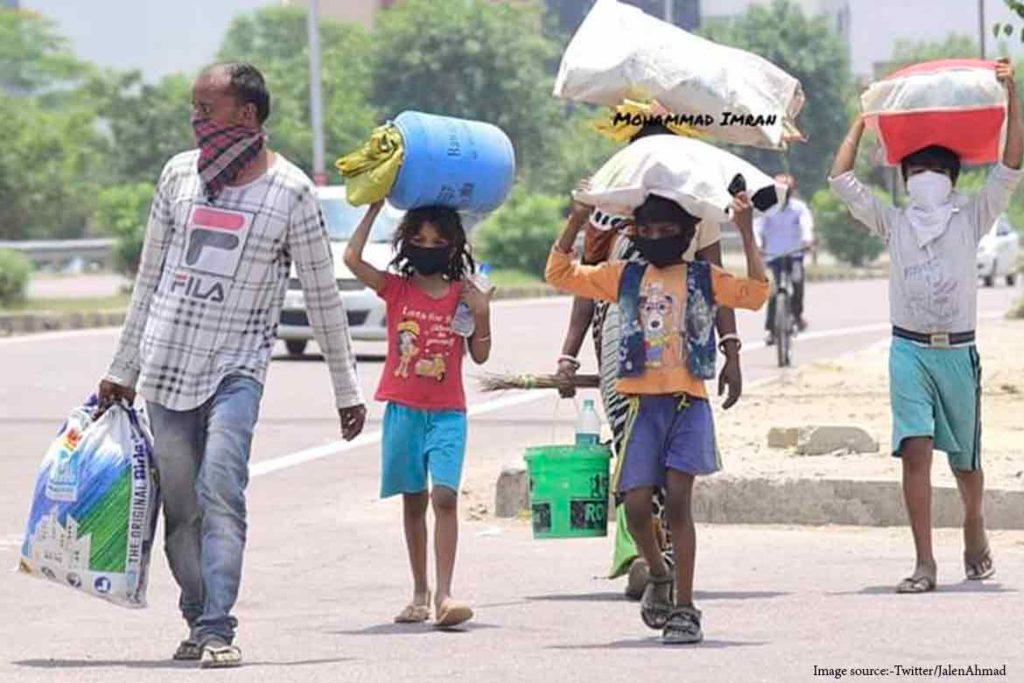As we have all seen the horrific problems faced by the migrant labourers during the Corona pandemic. Now citing this government is preparing a policy in this regard.
In the first of its kind draft, it has been proposed that an inter-state coordination mechanism for migrants should be prepared and there should be a migration wing in the labour department of the states, which can solve their problems. It has also been proposed that the right to votefor migrants should also be provided.
Also read: New Labour Codes May Allow Workers To Work Only For 4 Days A Week
It has been proposed to make political inclusion of migrant labourers and to prepare the data of their primary residence (state) and the state in which they are working.This report is being prepared by NITI Aayog and a working sub-group.
According to figures tabled in Parliament by Santosh Gangwar, Minister of State for Labour and Employment (Independent Charge), at least one crore migrant labourershad to leave the working city and return to their villages last year.
After all-round criticism on this, the Ministry of Labour had asked the NITI Aayog to prepare a report in this regard. After this, on February 8, Gangwar announced in the Lok Sabha to form a National Migrant Policy.
According to the report of the Indian Express, the draft policy describes how such people are facing political outcast due to which they face difficulty in voting, consequently, they are unable to raise voice for their demands on the political front.
Therefore, the report said that the political inclusion of migrant labourers should be done so that the political leadership can be held accountable for making laws or reforms for them.

Why the need for new legislation?
In the past, various reports pointed to the limitations of the Inter-State Migrant Workers Act, 1979, which was framed to protect migrant labourers from exploitation by contractors by protecting their right to non-discriminatory wages, travel and displacement allowances, and suitable working conditions. However, the aforementioned law onlycovers labourers migrating through a contractor, and does not include independent migrant labourers.
Given the size of the country’s unorganized sector, this approach now needs a review. The time has come for a comprehensive law for these workers, which would form the legal basis for an architecture of social protection. The new policy draft too, suggests that the Ministry of Labour and Employment should amend the existing law.

Labour Ministry will create a special unit
The function of the Inter-State Migrant Management Society will be to keep an eye on the major migration centres in the country, such as Uttar Pradesh and Mumbai, Bihar and Delhi, Western Odisha and Andhra Pradesh, Rajasthan and Gujarat and Odisha and Gujarat. It states that there should be a migrant worker section in the labour department of all states. Apart from this, the state should send one of its nodal officers to the migrating state, so that officer can work for the migrant labourers along with labourofficers of that state.
Disaster Relief
It has also been said in this report that emphasis should be given on giving benefits of disaster relief work to the migrants in urban areas. Along with this, health and other social security benefitshave also been asked to provide.
Skill Mapping
In the draft report, it has been suggested to prepare the skills related data of such people, provide social security through Aadhaar and provide psychological help for a national helpline.
Composition of Working group

NITI Aayog Working Group has held two meetings so far. The group includes members from the Ministry of Health, Ministry of Housing and Urban Affairs, Ministry of Rural Development, Ministry of Micro, Small and Medium Enterprises, Ministry of Skill Development and Entrepreneurship, Ministry of Road Transport and Highways and Ministry of Labour. Apart from Ministries, it also includes representatives from the Tata Trusts, Centre for Youth and Social Development, Disha Foundation, Livelihood Bureau, Deendayal Research Institute, Institute of Management Resources and General Development, International Organization for Migration, United Nations Human Rights Commission, UN-Habitat and World Health Organization.
